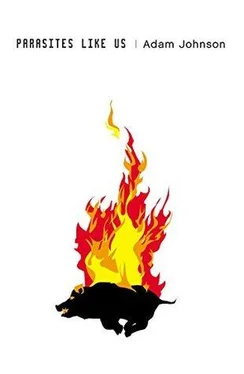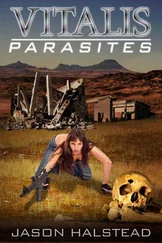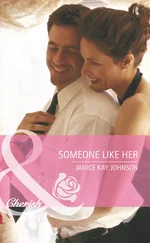I crossed the street at Bank, passed the statue of Harold McGeachie, “The Farmers’ Farmer,” and watched a roller-coaster car swoop above the trees in the park. It climbed its white scaffolding, paused atop the hump to let its passengers fret and moan before the load of colored hats, thick parkas, and trailing scarves plunged screaming from view. Before I pushed into the brass revolving door of the Red Dakotan, I paused to read the movie marquee next door, which was billing a double feature of “His & Hers Pistol Special” and “Super Scope Sale.”
The Red Dakotan had been built long before the dam, back in a time when Mississippi steamboats made it this far up the river, when wealthy passengers needed a place to freshen themselves and pass the time in luxury while military prisoners restocked the ships with coal. Inside, the wool carpets had a red fleur-de-lis design, and there was a staircase banister scrolled in the French style. Silver “smoker’s companions” stood astride each chair. By the bar, below the Dakotan’s wall-length gilt mirror, I spotted my father’s houndstooth sportcoat.
When I joined him, he was holding the hand of a woman who was leaving. He bowed slightly to her, extended a business card between two fingers, and said, “Enchanté,” before hailing the bartender with an order of two martinis.
He wore a new pair of eyeglasses with amber lenses, tinted like the safety goggles that shootists wear. He sported a mustard-colored vest, and he’d acquired a pinkie ring that was nothing but a huge nugget of gold. Here was my father, a man who in the six months since Janis’ death had managed to liquidate everything they owned together, sell his State Farm office, and reappraise all of southern South Dakota with a look in his eye that said, I’m ready. Man, I am ready.
“Enchanté,” I said.
He pretended not to hear me.
“Did you bring the Corvette?” he asked. “I may need the ’Vette later.”
“Let me see one of those cards,” I said, reaching for his breast pocket. “I mean, I take it you didn’t just try to sell that young woman insurance.”
He brushed away my hand. “You wish,” he said. “It happens I will be escorting that new lady friend to the radio theater tomorrow.”
I swiped one of the cards anyway. It read, “Frank Hannah,” and below, in fine script, “Appraiser of Fine Goods, Objects D’Art, & Rare Beauty.”
I said, “I notice you didn’t mention the word ‘Antiquities.’”
Dad gave me his “wise-sage” look, which consisted of lowering his head enough to eyeball me over the top rim of his glasses. “Son,” he said, “every woman has something hidden and valuable she wants to show you.”
“Like her underwear?”
He snatched the card back. “This wouldn’t work for you,” he said. “Look at your limp suit and mail-order spectacles. Who taught you how to shave? I woke up. I stepped out of the fire.”
He thumbed the length of his lapels and tugged his cufflinks, as if to say, See ?
“The fire? You mean the inferno that is marriage, fatherhood, and a career?”
“Hey,” he said, “I’m still your father. Don’t forget that. But here’s a tidbit I woke up to. There’s no such thing as insurance. You don’t bet against doom. You can’t sell policies your whole life and just hope disaster doesn’t come. You got to tip your hat when it comes, because it’s coming. So — send in the tornadoes. Let’s have the locusts.”
“I hope you’ve been drinking,” I said.
At the sound of the martini shaker, Dad closed his eyes. To the music of ice and frothy gin, he said, “Oh, lighten up. These are just musings. This is only Philosophy 101. If I wanted to give you real advice, I’d tell you to find a young girl, ten years younger, and marry her young. That’s as close as you’ll come to insurance.”
Of course he was referring to the death of Janis, but we had, at some point since then, come to a silent understanding: he never spoke my stepmother’s name, and I never said my mother’s.
Dad’s eyes popped open. “Come to think of it,” he whispered, “forget the Corvette. I may need the van tonight.”
He smiled for the first time, and I saw that his two front teeth, which had always been a tad discolored and out of alignment, now gleamed perfectly white with new crowns.
The martinis came, both dressed to my father’s exact specifications — a toothpick skewering an olive, then a folded anchovy, and finally a cocktail onion — so I knew my father had walked the bartender through a couple trial runs before I’d arrived.
Dad put some cash in the bartender’s hand. “We’ll want that booth over there, by the wall, and we’ll need our steaks sent over ahead of time.” He turned to me. “Two or three steaks?”
I looked around for Trudy, who was supposed to meet us for lunch, but she was nowhere to be seen. “Two for now,” I told Dad.
“Two it is,” he told the bartender. “Make them porterhouses, keep ’em rare.”
Then my father lifted his glass high, a thin film of fish oil catching the light.
“To floods and hail and the Great Deductible,” he said, and drank alone.
In the Parkton landfill was Janis’ Art Deco cocktail set, complete with flamingo-pink martini glasses and a tortoiseshell shaker. Gone also were her Bakelite clutch purses, her collection of dime-store brooches, and a little library of vintage etiquette guides, which her mother had taught from in the days of elocution. Dad had lightened his heart by shedding — the house, the furniture, the car — and, as if Janis’ spirit was small enough to inhabit anything, nothing they’d shared was spared, not the nail clippers, the alarm clock, the plastic ice-cube trays. He even ditched his own glasses, because they had once brought her into focus. Now my father lived in a tiny apartment, and except for a fair amount of money he needed to give away, there was no evidence that my stepmother had ever existed.
I had two theories on my father.
The first held that he had fallen out of love with Janis at some point in their marriage, and that her death, while not pleasant for him to watch, was an overdue relief. This father before me now, yellow-tinted glasses, raw gold ring, was the man I’d always have known, had he not been hobbled by some marriage vows, a nine-to-five job, and a conscience as old and guilty as two men’s.
I sipped my martini — it tasted appropriately oceany, and though I wasn’t much of a drinker anymore, it struck a long, clear note in my head. The second hypothesis had to do with my mother, but it would get no sympathy in this room.
My father looked at his watch. “Okay, so where’s this Trudy?”
“She should have been here by now. I told her to meet us a half-hour ago.”
“She’s not like this caveman guy of yours, wearing pelts and crapping in the bushes? Jesus, let’s give the money to that poor fool.”
A long-ago ocean, that was the quality of my drink, but shot through with sonar pings of alcohol. On my tongue, the ancient brine of salted fish and olive mixed with the bright light of oniony gin.
“That caveman,” I told my father, “has a grant from the Carnegie Foundation. He won an outstanding-dissertation-proposal award from the Academy of Arts and Sciences. Then he goes and wins funding from the state Heritage Council and the Bureau of Land Management. Now my department chair has decided to give him our only graduate fellowship, the Peabody, so Eggers will have to acknowledge us in his book. And this kid doesn’t even spend money.”
“Does he wear drawers under those skins?”
“I don’t believe so, Dad.”
He cringed. “I suppose toilet paper’s out of the question.”
Читать дальше












